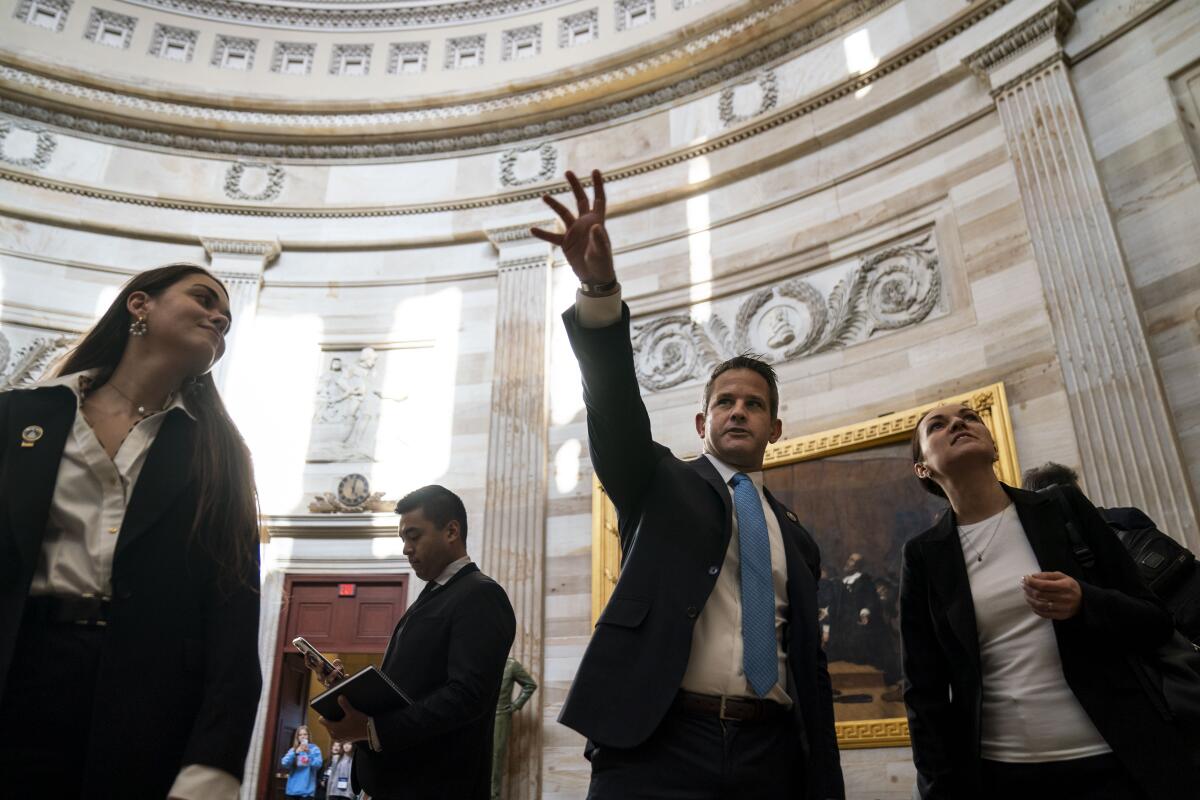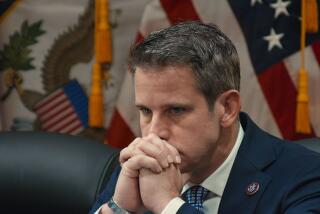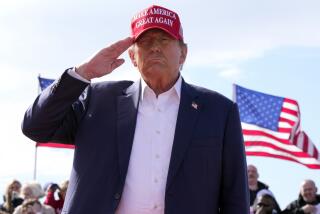Column: The lonely exit of Adam Kinzinger

- Share via
In January 2011, the Chicago Tribune published a Q&A with Illinois’ five freshmen in the U.S. House. Among them was Republican Adam Kinzinger, who had run for Congress after three tours in Iraq. When the quintet were asked, “Whom do you admire from the other side of the aisle?” four of them offered names. Kinzinger did not. Instead, he gave an answer that, in retrospect, feels as if it were written by Sophocles: “Those who are committed to serving their country.”
This week the House Select Committee to Investigate the Jan. 6 Attack on the United States Capitol published its final report and referred President Trump for prosecution. It also referred John Eastman, who devised the legal framework for the attempted coup, to the Justice Department. After more than a thousand interviews, a million documents and countless hours, this chapter of the book of Trumpism is finally closed.
Opinion Columnist
LZ Granderson
LZ Granderson writes about culture, politics, sports and navigating life in America.
For the seven Democrats on the committee, the journey has been long, but at least they can finally go home.
But for the two Republican members, who chose country over party, “home” is now a complicated word.
This is particularly true for Kinzinger, who announced in 2021 that he was not seeking reelection after his district was redrawn — although it is worth mentioning that had he run again, he would have faced the wrath of Donald Trump for voting to impeach him. During the Jan. 6 investigation, Kinzinger sold his house in his home state of Illinois and temporarily moved his family to Texas. He’s now trying to decide where “home” is — both literally and figuratively.
“There are a lot of factors for us to consider,” Kinzinger told me this week, besides housing costs and schools. “I don’t know where we’re going to settle down. We’ll see.”
Yes, we shall.
About all of it.
While the committee’s lengthy final report provides damning evidence against the former president as well as his co-conspirators, its recommendation to the Justice Department is similar to that of the Mueller report, in that evidence is all it can provide. It is up to the Justice Department to decide what to do with it, if anything.
Kinzinger said the committee’s investigation was different from the one conducted by special counsel Robert S. Mueller III into Russian interference in the 2016 election, because the attorney general didn’t try to get out in front of the Jan. 6 committee’s messaging and its process was transparent. But the congressman does acknowledge he may have to live with the fact that charges won’t come.
“I always assumed everyone in politics had their version of a red line, that one thing they won’t do,” he said. “My faith in the people who become politicians has become really damaged. I now look more realistically at politics.”
I told him that sounded sad.
He said it was sad.
“It’s been a dark couple of years for me,” he shared. “This has been all-consuming. I went into this job at 32 as a Republican because I believed in the mission, and now I don’t know what the mission is. Ukraine is way more divided politically than we are. But you see what happens when their freedom is threatened. They are willing to die for it. We have what they are fighting for, and we are trying just as hard to get rid of it.”
Strong words from someone who voted for President Trump in 2020 and sided with his agenda more than 90% of the time.
And therein lies the rub with a political figure like Kinzinger. His participation in the Jan. 6 committee is appreciated by the left, but his voting record is pure right.
“Trump basically inherited a Republican agenda and went with it,” Kinzinger said of his own voting record. “I can’t think of any vote that I regret.”
Kinzinger voted against the John Lewis Voting Rights Act but supported the Respect for Marriage Act, which President Biden signed into law last week, codifying federal recognition of same-sex and interracial marriage.
Son of a third-grade teacher and the director of a Christian outreach program for the homeless, Kinzinger has out gay staffers and says he’s disappointed to see his party’s regression on the issue.
“I think to them it’s just about owning the libs,” he said. “If your neighbor is transgender, that’s not your issue. Let them be. At the end of the day, it’s America. Live your life however you want.”
As lovely as that sounds, it’s hard for me to see a congressman who so frequently sided with Trump as a “live and let live” kind of person. Nor would I characterize voting for Trump in 2020 — given everything we then knew him to be — as a “live and let live” vote. I pressed Kinzinger on that one.
“I was a big sissy,” he said. “I thought, [Trump] is not going to win Illinois anyway, so it wouldn’t matter. I didn’t vote for him in 2016 and was heavily criticized for it, so I voted for him in 2020 just to have one less thing people could come at me with.
“I’m telling you this because it’s important to tell people that there’s nobody that’s perfect in resistance or courage. Self-governance is the hardest form of government.”
Kinzinger was not aware just how far Trump’s rot had reached until Jan. 6, 2021. He was not aware how far people were willing to go to serve Trump until the investigation unearthed frightening details, like the never-issued executive order that would have seized voting machines.
Then there was the correspondence of Trump’s White House chief of staff.
“All of Mark Meadows’ text log was shocking, but the biggest personal shock was seeing how much Ginni Thomas was texting him,” he said of Justice Clarence Thomas’ wife, Virginia, a conservative activist. “Who saw that coming?”
Who saw any of this coming?
Back in 2011, when Kinzinger told the Tribune that he admired “those who are committed to serving their country,” who knew a decade later he would have this historic opportunity to prove it?
Of Minority Leader Kevin McCarthy, Kinzinger said: “He disappointed me because I know him. I was friends with him. I used to think he was a great politician with a moral compass. I now see he’s just a politician without a moral compass.
“The day before impeachment I thought there would be 25 [Republican] yesses.”
And then, on Jan. 13, 2021, there were only 10 Republican votes in favor of impeachment.
“People would later call and say, ‘I just can’t do it’ or ‘I want to run for Senate’ or something like that. It was such a foreign way of thinking. It was a lesson about people for me.”
Where he will apply this hard-earned lesson is a mystery.
If you ever wondered why the forefathers feared a two-party system, look no further than Kinzinger, a decorated war hero who doesn’t have a party — or even a state — to call home.
Clearly the country is indebted to both him and the other Republican on the committee, Rep. Liz Cheney, and yet both were forced out of office by the business of two-party politics. There are many issues he and I disagree on. Where two hopeful fools like us find common ground is our unrelenting belief that America will fulfill her promise.
“I truly believe in this country,” Kinzinger said. “Democracy is not defined by the bad days, but how it recovers.”
More to Read
A cure for the common opinion
Get thought-provoking perspectives with our weekly newsletter.
You may occasionally receive promotional content from the Los Angeles Times.












